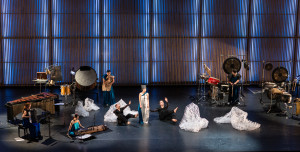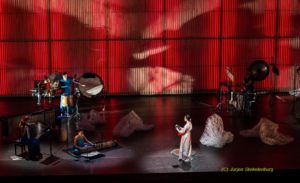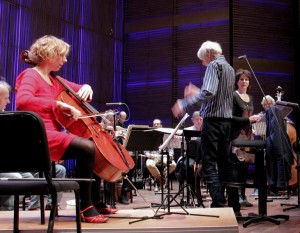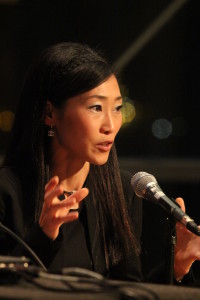Biographically Speaking
Jerry Williams’ entire family, on both sides, originated from Harlan, Kentucky, a coal town in the southeastern part of the Bluegrass State, a place of great importance to labor historians and country singers. His ancestry consists mostly of alcoholics and pill addicts, xenophobes, agoraphobes, preachers, toothless Felliniesque pinheads, veterans of foreign wars with unidentifiable diseases, attempted murderers, moonshiners and bootleggers, racists, golfers, magicians, disability royalty, suicides, freemasons, one cop killer, and a legion of mourners. Before he arrived on the scene, his mother and father and his two sisters moved north to Dayton, Ohio, birthplace of African-American poet Paul Lawrence Dunbar, Guided by Voices, and sibling aviators Orville and Wilbur Wright. Over the years, he has been an infant; a child; an adolescent; an adult; a gym rat; an undergraduate at Vermont College, where he received a B.A. in English; singer in a band named after a Sam Shepard play; landscaper; typist; bartender; delivery driver (auto parts); cashier; telephone solicitor; dishwasher; librarian’s assistant; Los Angeleno; San Franciscan; Princetonian; Tucsonan (he did an M.F.A. in Creative Writing at the University of Arizona); as well as a reluctant Stillwaterian, where he earned a Ph.D. in Creative Writing at Oklahoma State University.
After spending two years in Bristol, Rhode Island, as a Visiting Assistant Professor at Roger Williams University, he settled in New York City. Currently, he lives in Manhattan and works as an Associate Professor of Creative Writing at Marymount Manhattan College. His poetry and creative nonfiction have appeared in American Poetry Review, Crazyhorse, Witness, Pleiades, Hayden’s Ferry Review, New Ohio Review, Tin House, and many others. His first collection of poems, Casino of the Sun, published by Carnegie Mellon University Press in 2003, was a finalist for the Kate Tufts Discovery Award. Carnegie Mellon published his second collection, Admission, in 2010, which received the Devil’s Kitchen Reading Award from Southern Illinois University. In addition, he edited an anthology of breakup and divorce poems entitled It’s Not You: It’s Me, which Overlook Press published in 2010. He has received a grant from the New Jersey Arts Council, several Academy of American Poets awards, a fellowship from the Corporation of Yaddo, and a number of Pushcart Prize nominations that never panned out. He has no passport and no plans to obtain one. He virtually loathes the Beatles, Bob Seger, and the Grateful Dead. He is not a true believer in the holy writ. He eats almost nothing but Soylent, though he loves peanut butter. His third collection of poetry, So Thirsty All My Life, is well under way and the poems are rawboned as ever, aurally inevitable as ever, possessed of a narrative/lyric hybridity that grounds the work in story and song, and, as the title suggests, the work explores the seemingly conspiratorial and systemic thwarting of desire. His memoir-in-progress, The Wrong House, a book about fleeing the Midwest, will be finished when it’s finished, goddamit, so stop asking.
Music Box no. 1
The following are two poems by Nan Sul Hun (1563-1589)
translated by Jerry Williams and Seung-Ah Oh.
Letter from My Paramour
A wanderer arrives from a faraway place
And brings with him a pair of carp
Looking for something inside
I slice open the belly of one fish
And a letter written on fine silk flows out
The first words appear Always thinking of you and
Tell me how you are doing these days
I read this letter and I understand
I understand until tears wet my sleeves
© 2015 The Ocean State Review
Audio of Letter from My Paramour
Elegy
Last year I lost my beloved daughter
This year I lost my only son
Upon the sad sad earth of Kwang Neung
Two rising tombs stand face to face
Poplar trees shiver in the lonesome wind
The pine forest trembles in ghostly light
When I spread paper money before your procession
And poured a glass of wine over your graves
I was calling out to your souls
You my children brother and sister
I envision your poor spirits
Playing in the woods every night
The child now growing in my belly is unfair to you
So I sing a useless song with no sound
And swallow the bloody tears of my sorrow
© 2015 The Ocean State Review
Audio of Elegy
During a 2013 summer residency at Yaddo, Jerry Williams met Korean composer Seung-Ah Oh. The two artists became friends and, later, collaborators. At the time, Oh was working on Words & Beyond II: Nan Sul Hun, a music theater production about an underappreciated 16th century Korean poetess. Fascinated by Nan Sul Hun’s courageous story, Williams asked Oh to co-translate a few of her haunting poems. Ultimately, Oh included five of their translations in her music theater piece, and Williams also wrote a monologue/soliloquy for the title character. Commissioned by Slagwerk Den Haag, Words & Beyond II: Nan Sul Hun opened, to rave reviews, on October 29th 2014, in Muziekgebouw aan’t IJ, Amsterdam. Below, you can view mementos from the production as well as a significant portion of the performance itself.

Music Box no. 2
While at Yaddo, Seung-Ah Oh also began work on a double concerto for voice, cello, and chamber orchestra. In this piece, she sought to explore the deep-rooted impediments to interpersonal communication, to expand her sound world to include more noise-based gestures and motifs, and to give expressionlessness a chance to speak for herself rather than foist upon her a preordained idiom. In the aptly titled Aphonic Dialogue, two soloists, voice and cello, progress from indifference to détente, from cacophony to harmony. Again, Jerry Williams provides words for the singer: a lone sentence with an eyeful of Nan Sul Hun palinopsia and a ton of options. Commissioned for the Cello Biënnale in Muziekgebouw aan ‘t IJ, Amsterdam, Aphonic Dialogue opened, to rave reviews, on October 23rd, 2014. Below, you can view a memento from the production, listen to a recording of the performance itself, and read/hear the sentence as word blob.
Musical Recording of Aphonic Dialogue
Aphonic Dialogue
1
When she woke in the woods
in the dark and the cold of the night
she reached out and touched
a spear of blue moonlight.
2
She out-touched the blue of a cold spear
when the dark of the woods and the night woke moonlight
and she reached in, in.
3
Out in the blue of the night
when she reached a spear-touched woods
she woke moonlight and the dark and the cold.
4
When in the cold,
the dark woods reached,
she and moonlight woke the night of a spear in and out—
she of the touched blue.
5
When the dark in the spear of a night woke
and the blue out reached in and touched the woods,
she cold, she moonlight.
6
Reached in the moonlight and a spear of blue,
when the cold out dark woke the night,
she in and of the woods, she touched.
7
She woke blue and she reached moonlight
in the woods and in the cold of when the dark out
touched the night of a spear.
8
Spear moonlight
in the when of the woods
and she reached of a blue cold she touched.
and dark she woke
9
In the woods she woke out of and in the night,
she reached a cold and blue moonlight
when the dark of the spear touched.
10
The cold of moonlight
and the blue in the dark night
woke a woods she touched
when she reached in and out of the spear.
© 2015 The Ocean State Review
Audio of Aphonic Dialogue
Don’t leave the past in the past: a look at Jerry Williams’ previous work
Unadorned
I let a dog in the park lick my face for you.
I pretended not to know the murder rate in Denmark for you.
I’ve tried to stay ugly for you.
I turned myself into an oil field, switched on the klieg lights
for you, and let Texaco start drilling.
I never thought about the future for you or else I thought about it
in terms that only you could understand,
though we had never actually met.
I worked in a cardboard box factory for you.
I gave up skin for you.
Whenever love metastasized, I ran over it with my lawnmower
for you.
I wrote “Stairway to Heaven” for you.
I did the whole Reverend Dimmesdale thing for you.
For you, I tramped around town smelling old books and thinking
of better days.
If it weren’t for you, I might have thrown open the door to any
number of empty apartments and gone straight
for the knife drawer.
I quit the team for you, I quit the band for you.
I survived—for you—a major stork attack at the free clinic.
I romanticized the Russian Revolution for you.
All that weight and all those miles for you.
For ages, I drove really shitty cars for you, cars with bald tires, cars
that burned a quart of Quaker State a day,
cars with no reverse.
I passed the Clean Hair Act of 1992 for you.
I took the pill for you.
I took my pulse pass/fail for you.
I took all the wheelchairs out of this poem for you.
I scrutinized the maps of various principalities and prowled around
the depths of their free print media,
scavenging underground for you.
I’ve stood at the podium and knelt at the peephole for you.
One night I camped out on the sidewalk to protest against
something for you—I can’t remember what it was—
but I’m sure nothing was ever done.
I had my juvenile criminal record expunged for you.
I secretly hoarded food for you.
For you, I’ve spent fifteen of the last twenty-two Christmases alone
on the couch with The Catcher in the Rye.
For you, I’ve suffered bouts of Pernicious Cubical Zombification
that no amount of Prison Movie Therapy could cure.
I fell this far without you for you.
Anyone goodhearted or wounded enough to fill in for you got
bombarded with encrypted code left over
from the War of Adolescence which, by the way—
totally based on false intelligence.
For you to believe a word I’m saying, you have to admit that when
my hand floated palely away, I forgot
every single breast I’ve ever touched.
This is me trying to settle down for you.
This is me putting my bullhorn and my guillotine
in the attic for you.
I’m turning gray for you.
So, please, tell me
when will you be born?
© 2010 Carnegie Mellon University Press
Audio of Unadorned
Because she is so supercelestial and permits the occasional supercresecent supercharging, Jaclyn Cohen, charter member of the band Foxygen, delivers herewith her own recitation of the poem Unadorned
Imprinting
Whenever anyone asked the father
what was playing at the movies
or what was on television
or who was making all that noise in the attic,
his answer would always be the same:
Deaf and dumb woman showing a blind man her ass.
Then he’d lean back in his chair,
ransack his two-day growth of beard,
and snort contentedly.
If you wanted your answer,
you had to investigate on your own.
But first you had to gain control
of the necessary mode of inquiry—
Dayton Daily News, T.V. Guide, Black & Decker flashlight.
This was no easy task.
The father was cagey and quick.
Snatching the item from his grasp took ten or fifteen tries.
Deaf and dumb woman showing a blind man her ass.
He spoke with an exaggerated southern drawl,
pronouncing deaf as if it were spelled D-E-E-F,
clearly blaming the cracker within himself.
And, of course, they all laughed, the whole family,
this being the longest running joke of the decade.
Years later, the son would wonder how much
that portrait of unattainability
had influenced his outlook on the world.
He wondered if being party to the father’s constant
sarcasm had turned him
into a half-empty rather than a half-full type of individual.
Or if he’d simply been infused
with a heightened sense of irony.
The answer lies in the image itself.
A voluptuous woman with long black hair
presents her perfect round ass to a man who has no eyes
to see it with and seems to have no hands to touch it with,
no idea he’s in the presence of such beauty.
There’s only a small distance between them,
but she’s deaf. She could not hear the man
if he cried out, “I am blind! What is happening to me?”
and she couldn’t reply even if she did hear him,
for she has no voice.
The son can envision their disconcerted faces,
their straining gestures.
They are lewd yet toilsome,
weary as medicated glaciers.
They are the saddest people on earth.
© 2007 Barrow Street
Audio of Imprinting
Casino of the Sun for the Markovich brothers
It’s Christmas day in Arizona:
one hundred and sixty degrees above zero and rising.
When you get off the plane,
which you secretly hoped would crash,
and pass through that gray chute,
your old roommate, the Chin, greets you,
lathered in the ocher of a different time zone.
Nakedly joyful, a boy of ten or eleven
jumps into his father’s arms.
A camera flashes and the Chin snorts,
Another chat room dream come true.
Close your eyes, imagine giving birth
to a thousand mallard ducks inside a shark cage
while some non-union uniform runs a metal detector
up and down your leg, up and down your other leg.
Welcome to hell. Try not to spill your margarita.
Try not to let the molten parking lot solidify
in your lungs when you hear about your ex-girlfriends
riding the cranks of hard-minded day traders
in Mustique or Minorca
or wherever people go who have parents.
There’s a bed waiting for you in the desert,
though the sheets were not prepared for your arrival.
The cordless phone is dead,
but the cable television works fine.
Shaquille O’Neal just missed another free throw,
and we all know why. He brings the ball
too close to his face; he smells his fingers.
He’s distracted by his own good fortune.
Those guys have it made: ballplayers.
The Chin says they live like dolphins.
Shaq, Sprewell, Allen Iverson. Sweet.
What am I doing here anyway? This is not my affair.
I’ve drunk blood from a leopard print purse,
said I love you under my breath,
shared an apartment with a terrified and weeping,
uprooted fleshpot
who caught me looking at pictures of lepers.
I have checked the pulses of dead husbands
and disagreed with the diagnosis,
listened through walls for signs of forgiveness,
been counted on and let down and squeezed out.
I bet I would sell my organs in China,
I would build electric chairs for a dollar an hour
if I could only put together enough scratch
to go back in time and burn the right bridges.
By next Christmas, I vow to pledge my life and mind,
my entire troubled essence,
to a beautiful cyborg with reliable taxonomy
and skin the color of grape soda.
But for now, the Chin toasts the end of an era
in a bar on the edge of effectiveness.
A lonely jingle leaks out of the sound system,
and the patrons sing along like there’s no tomorrow.
Every Sunday morning they wake up
with inexplicable cuts and scrapes on their hands.
These are your people.
They would offer you the world
if they had any right to it.
© 2003 Carnegie Mellon University Press
Audio of Casino of the Sun
Harlan County Copula
My mother walked me by the wrist,
limping, back to the farmhouse,
her thickly freckled hand cold
as though she’d leaned against a headstone
in the cemetery where the dead
of this hollow lie buried.
We were either on the moon or in Kentucky,
visiting second cousins.
The drive south seemed all downhill
until we reached Pine Mountain.
That was the summer the coal miners
at Brookside and Highsplint struck.
The UMWA marched through the streets
of Harlan with pickaxes reflected in their eyes.
I’d spent the day with Robby at the creek,
catching crawdads in butter bowls
and blasting them with rocks at close range.
The water being warm, we went shoeless,
and I sliced the milky arch of my foot
on a broken Pepsi bottle.
Until I came out of the water
and saw my footprint
on the bank filled with blood,
there was no pain.
Across town a miner lay on a blanket of blood
and stared into the sun with his eyes stuck,
no longer complaining,
no longer on the clock,
quite unaware of the movie camera
that snored in the sickbed of history,
unaware of my mother putting her hands
around my waist and lifting me up
to the kitchen table
which I must have mistaken for sky.
© 2003 Carnegie Mellon University Press
Audio of Harlan County Copula
Jerry Williams’ Cross-Genre Accomplice
Seung-Ah Oh is a Korean composer whose work has premiered all over Asia, Europe, and North America. She has received fellowships from the Guggenheim Foundation, the Rockefeller Foundation, Tanglewood Music Center, and the American Academy of Arts and Letters, among others. She has received many awards, including first prize at the 3rd Seoul International Competition for Composers, the Lutoslawski Award in Poland, and the coveted Toonzetters Prize in the Netherlands. She studied music composition at the Royal Conservatory of the Hague and later earned her Ph.D. at Brandeis University. Dr. Oh has elegantly merged her training in the contemporary Western tradition with the rich musical influences of her own heritage. She has taught at Brandeis University, the Massachusetts Institute of Technology, the University of Florida, and the Oberlin Conservatory of Music. In the fall of 2011, she joined the faculty of DePaul University as an Assistant Professor in Composition. She divides her time between Chicago and Amsterdam.
Seung-Ah Oh’s website: http://www.seungahoh.org/




